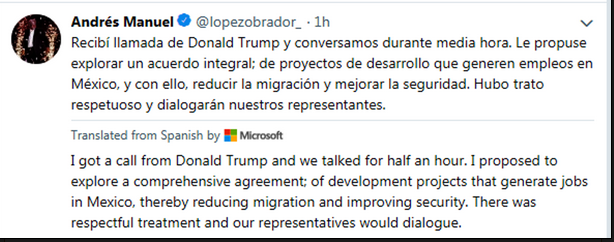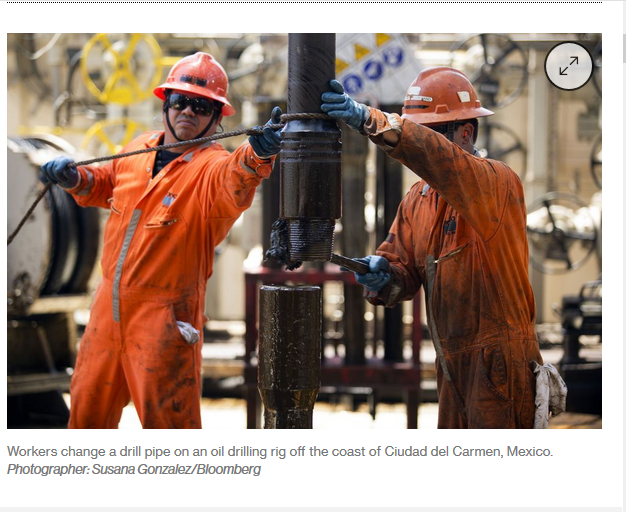With 53% of the votes Andrés Manuel won yesterday. Never in the history of Mexico this had happened.. It was indeed historic.
AMLO, el home run - Elecciones 2018
AMLO, el home run - Elecciones 2018
With 53% of the votes Andrés Manuel won yesterday. Never in the history of Mexico this had happened.. It was indeed historic.
AMLO, el home run - Elecciones 2018
Well, this historic moment feels weird, everything is in calm. Yesterday, TV media I saw was the same mostly, everyone being civil, and that was weird as well, but ... from what I heard at Radio Spanish Network of SOTT last saturday, is that, it would had been preferable to let him win for the time being, and, it seems that was the case.With 53% of the votes Andrés Manuel won yesterday. Never in the history of Mexico this had happened.. It was indeed historic.
I saw Trump's twitter last night regarding AMLO, so far so good? both behave political corrected? or perhaps, having both similarities they might get along better ... Trump (US) do not longer wants immigrants going to US, and, AMLO (Mexico) does not want to send people there either, he wants to make things better here so people will not run at north ... both seeing after their people, although regarding deep state, asy you mention, he already knows, we are going to see if he can hold. Problem I see, is that people has a very high expectation, and AMLO will have to adress yesterday the issue about insecurity and corruption, that in most cases, go hand in hand. Not sure he be able. though.I'm really interested to see the outcome of this new person for the following years, Mexico to me its kind of doomed because of its big neighbor. Although we saw how Trump got elected in the empire itself and we also saw how Trump got controlled by the Deep State later on. I hope that doesn't happen with Andres L. in Mexico but I won't hold my breath either. He has to have a huge knowledge of how things really work and have to have a really good strategy and be very patience if his intentions are real cuz the level of corruption in Mexico its very high OSIT.

https://www.bloomberg.com/news/articles/2018-07-03/amlo-s-got-a-mandate-what-comes-next-for-mexico-quicktakeI think a lot will depend on how smart AMLO turns out to be. My impression is that he is good-willed - or at least he is nowhere near the 'communist dictator' that the media claimed he would become - but I'm not sure about how competent, astute and realistic he is. For example, in dealing with Trump he may try to antagonize him (mistake), or he may try to convince him that they can both work against the immigration problem by developing Mexico's economic base (that's what he hinted at in his tweet above, so that's good news).
He can go on a fight over NAFTA and/or whatever replaces it, or he can negotiate carefully while signing new deals with the rest of Latam, Europe, Russia, China, etc. In other words, Trump's stance is an opportunity for Mexico to take a lot of eggs off that particular basket.
Antagonizing corporations would also be a bad idea, but that doesn't mean he should let them exploit resources and people at will as they have been able to do historically.
His leftist tendencies, whether that's good or bad will depend on how far he goes with them and how. For example, for a country like Mexico I think it would be great to invest in social welfare. There is a public health service, but it's insufficient and inefficient, and private health is only available for upper classes. Investing in modern hospitals and doctors would make a huge difference on people's quality of life. Having some sort of 'safety net' for the unemployed would also be a good idea, but of course that would have to be done carefully because I can imagine a hundred ways Mexicans would abuse of it.
Modernizing farming, and even subsidizing it at least for a while I think would also be good. Make the country self-sufficient on its basic needs (AMLO did mention this, so that's good). For example, Mexico consumes tons of corn, yet I believe most of it is imported from the US! That has to change. Personally, I would also seek to educate people about what's healthier to eat and help and promote those farms that provide the better quality food - but we know there's a lot of resistence to that, so we'll have to settle for corn.
Although 'left' in Latam doesn't mean exactly the same as in Europe and the US (it's a more 'old-fashioned' left, 'anti-imperialist', 'socialist'), I'm afraid that the 'identity politics' ideas are filtering down to the region, so unfortunately we'll see much of that nonsense coming up under AMLO. I hope not too much.
Regarding crime, he has proposed some sort of amnesty. I'm skeptical about this idea, but I suppose that if the amnesty applies only to non-serious crimes, then it could help. The big organized crime groups should still be tackled, but not by simply trying to get rid of the heads of the mafia (as has been done in the past), cause then someone else will simply take their place. There won't be a simple solution. Crime should be attacked at the same time as poverty and corruption. Cleaning the police and the military and re-moralizing them should be a priority, but then, how do you do that? And some sort of moralizing public campaign would not hurt - something to remind people to resist the temptation of crime and corruption at their own level. Although it's taboo in Mexico to mix religion with politics, such campaign could even have religious undertones if that brings better results.
As you can see, I often play the game of "What would I do if I was president of Mexico" in my mind. :)

I am too wary as well, we will just have to wait and see, and keep informed as well, even though, Morena es getting as well the congress -deputy and senators, it wont be easy, it has problems at home, and the upcoming problems from the outside, was reading the other day that the tariff battle may be worst for emerging economies. Ay! ... but, from a crisis we should better see opportunities, something that I repeat myself constantly ...Perhaps I am too wary, but it has already happened before, others who started a government with a very explicitly combative discourse, perished in the attempt. Despite this, I believe that the historic change that has just taken place is encouraging.
Who is López Obrador? Mexico's AMLO, Trump and the error of comparison
The New Yorker, July 3, 2018
To tens of millions of Mexicans, Sunday's stunning electoral victory by the charismatic leftist candidate Andrés Manuel López Obrador, a perpetual also-ran in the country's recent Presidential elections, was an apotheosis. López Obrador, or AMLO, as he is also called, won fifty-three per cent of the vote, leaving his nearest rivals, including Ricardo Anaya of the conservative PAN party, far behind. Not only did López Obrador win; the party that he founded a few years ago-the Movement for National Regeneration-also won a majority of seats in both houses of the national legislature, and it took five of the nine governorships that were up for grabs. It was, as they say, a real sweep. And unlike a number of recently disputed elections in Mexico, López Obrador's win was the chronicle of a victory foretold. To many observers, he has been the favorite to win this year's election since Donald Trump took office, a year and a half ago.
Comment: Political earthquake in Mexico: Leftist AMLO achieves historic landslide election victory
The outgoing Mexican President, Enrique Peña Nieto, will hand over the reins to López Obrador on December 1st. He leaves behind a country with tattered morale and widespread doubts about the future. Rarely has a President so fumbled his term in power the way Peña Nieto has-from adopting a posture of obsequiousness with Trump to giving the appearance of either powerlessness or complicity amidst a culture of wholesale political corruption. Peña Nieto's inability to slow down the country's gruesome "war on drugs"-which was initiated by his predecessor and has cost as many as two hundred thousand lives-has deepened the sense of national despair. He has failed to prosecute some of the most horrific criminal cases that have occurred on his watch, including the disappearance and suspected mass murder of forty-three teaching trainees in the town of Ayotzinapa, an incident that reportedly involved local politicians, police, a drug gang, and the Army.
Enter López Obrador, an unabashed left-wing politician who has built up a base of national support through good old-fashioned grassroots campaigning over the past twenty years. By any definition, he is an extraordinary political figure. Born and raised in the state of Tabasco, a Gulf Coast backwater, López Obrador is a curious blend. An unassuming man of simple tastes and a reputation for personal austerity, he is also a published historian with a half-dozen books to his name, and he's a passionate follower-and player-of baseball. On Sunday, at the age of sixty-four, he has also become the most powerful person in Mexico, someone who promises to end the country's culture of corruption and to launch it into a new era-what he calls the "fourth Mexican transformation." The first came with Mexico's independence from Spanish colonial rule, in 1821; the second with Benito Juárez's liberal reforms and his return to power, after ousting the French-imposed Habsburg emperor Maximilian, in the eighteen-sixties; the third was the epochal and bloody Mexican Revolution, in the early twentieth century. López Obrador promises that his transformation will be a peaceful one.
With his triumph, López Obrador ends an eighty-eight-year hold on Mexico's political power by two parties-the PRI, which ran the country from its founding, in 1929, until 2000, and the PAN, with whom it has alternated power ever since. He also bucks the trend to the right that has swept Latin America. Lately, the so-called Pink Tide of the Hugo Chávez era has collapsed in country after country, replaced by a seemingly inexorable wave of conservatism, which includes, as in the United States, its own share of populists and demagogues. In Colombia's most recent election, which took place two weeks ago, the right-wing politician Iván Duque came first in the polls over his left-wing rival, Gustavo Petro. Duque's victory was largely based on instilling fear in the Colombian electorate that Petro, a former guerrilla, was a kind of Trojan Horse for the "castrochavista" left of Venezuela and Cuba.
López Obrador's rivals tried to brand him as a castrochavista as well, but it never worked, and it didn't stop his momentum. Although a man of the left, López Obrador demonstrated his pragmatism during a stint, between 2000 and 2005, as the mayor of Mexico City, where he worked with ideological adversaries to get things done. A case in point was his alliance with the Mexican telecom magnate Carlos Slim, with whom he formed a public-private business partnership that brought life-and people-back to the neglected and crime-ridden historic city center. During his Presidential campaign, he also made huge efforts to reach out to his traditional foes in the private-sector business élite, who fear that López Obrador is a socialist in sheep's clothing. This all-powerful cabal of Mexican empresarios has been crucial in keeping him out of power in the past. Almost everyone in Mexico agrees that, in the 2006 election, for instance, when López Obrador lost by less than a half of one per cent of the vote to his PAN rival, Felipe Calderón, it was fraud, aided and abetted by the private sector. (Whether or not fraud was the determining factor in his loss in the 2012 election is less clear-cut.)
López Obrador's celebrated his victory on Sunday night like a rock star, showered with confetti and hailed with ecstatic applause and cheers on a stage in front of a huge crowd that had gathered in the Zócalo, the vast public square outside the Presidential palace where the Aztecs once maintained their seat of power. The moment was not only a personal victory for López Obrador but a victory to the countless ordinary Mexicans who voted for him, many of whom have always felt excluded from the political life of the country. They include those who come from the atomized indigenous and agrarian communities around the country that are overrun with narcos, those who emigrate en masse to work in potato fields, and busboys and cooks living in the United States. At a time when the nation's morale is at an all-time low, not least because of Trump's hurtful invective, but also because of a broad sense among Mexicans that their own political culture has failed them, López Obrador restores a measure of hope that Mexico is a country worth being proud of. The expectations he has raised are enormous, and he has not shied away from the prospect of raising them further.
On Sunday night, López Obrador repeated the promise he made many times on the campaign trail: "I will not fail you, I will not disappoint you, and I will not betray the people." He made it clear that he also wishes to be a figure of unity, by issuing a call for Mexicans to put aside their differences in national reconciliation, "because the fatherland comes first." In a hopeful sign, both his rivals conceded quickly and congratulated him on his victory, as did Peña Nieto.
For a recent piece for the magazine, I accompanied López Obrador on three separate campaign trips and had several conversations with him. The main feeling I came away with was that López Obrador has a strong sense of historic purpose in what he is doing, and that he genuinely believes in the ability of Mexicans to rise above their circumstances with his help. Those who have compared his populism to Trump's are fundamentally mistaken, in my view; López Obrador's populism is built not on a hatred of "the other," or on a need to prevail at the expense of others, but rather on an intuitive faith that Mexicans can overcome their current reality with a redeployment of their most outstanding national traits-hard work, resourcefulness, pride, modesty, and bravery.
There is another difference between López Obrador and Trump. With Trump, "America First" seems to involve an aggressive hunkering down and the erection of a notional Fortress America that not only shows an unfriendly face to the outside world but threatens to use its raw power to impose its will. As the beleaguered southern neighbor of the U.S., Mexicans are especially vulnerable in the Trump era, and López Obrador seems to understand that he needs to proceed with caution but also with firmness. In the face of Trump's proposed wall, dividing the two nations further, López Obrador has proposed greater togetherness, and has said he will establish a thirty-kilometre-wide free-trade zone along the entire length of the Mexican-American border, with significantly reduced taxes as an incentive for more American companies to come and do business there. Trump proposes the expulsion of millions of Mexicans and other "illegal aliens"; López Obrador has countered with calls for a series of F.D.R.-style make-work projects that involve tree-planting and various infrastructure programs to encourage Mexican workers to stay at home.
López Obrador was renowned in the past for having a hot temper, but he has learned to keep his true feelings in check. Nowadays, he says a great deal with his eyes, and sometimes with a smile or a pointed look. In one of our conversations, he quipped, "We have had some bizarre characters in Mexico, but Donald Trump?" He opened his eyes wide, shot me a theatrical smile, and hit the table with both his hands.
But, for most Mexicans, Donald Trump is the monster who lives in the cave on the mountain above, a fact of life that they can do little about. They do not expect Andrés Manuel López Obrador to change that, but to make their lives more bearable, perhaps, with the grand gesture of his presence on their national stage. At home, what they most want him to do is what he has promised them over and over on the campaign trail-to end Mexico's corruption. As Carmen Aristeguí, the doyenne of Mexican investigative journalists, wrote me to say recently, "The goal of Andrés Manuel López Obrador is to pass into history, nothing more and nothing less; to be remembered like the founding fathers were. One does not expect Andrés Manuel to be just another manager of the chaos. One hopes that he will direct the country towards a new logic of political power, and of citizenship, that will allow the dismantling of deeply-rooted structures and practices that have always dominated Mexico. If Andrés Manuel manages to eradicate the systemic corruption in Mexico and doesn't do anything else during his time in government, that will be reason enough to raise a statue to him and to tell his story in all the primary school books."
Jon Lee Anderson, a staff writer, began contributing to the magazine in 1998. He is the author of several books, including "The Fall of Baghdad."
Comment: AMLO and Trump are similar in that they were both 'outsiders' from the establishment and people recognized them as such, which is largely why they won their elections. They are different though, in that one comes from the 'left' and the other from the 'right'. But perhaps more signfiicantly, at this point in time the overwhelming majority of Mexicans are united behind AMLO, while unfortunately the US is deeply divided for or against Trump.
At this moment Mexicans are cautious but more hopeful than they have been in a long time. Whether AMLO fulfills the expectations will depend a lot on how skillfully he can navigate the forces domestically and internationally pulling him in different directions, such as free markets vs 'socialism', globalism vs nationalism, traditionalism vs identity politics, etc. But of all his challenges, the one that will make or break him is the promised fight against corruption.

https://www.bloomberg.com/news/articles/2018-07-05/landmark-mexico-oil-reform-is-set-to-stay-amlo-s-chief-of-staff
https://www.bloomberg.com/news/articles/2018-07-09/security-on-mexican-borders-to-get-new-force-but-not-from-trump?cmpid%3D=socialflow-twitter-politics&utm_source=twitter&utm_medium=social&utm_campaign=socialflow-organic&utm_content=politics
